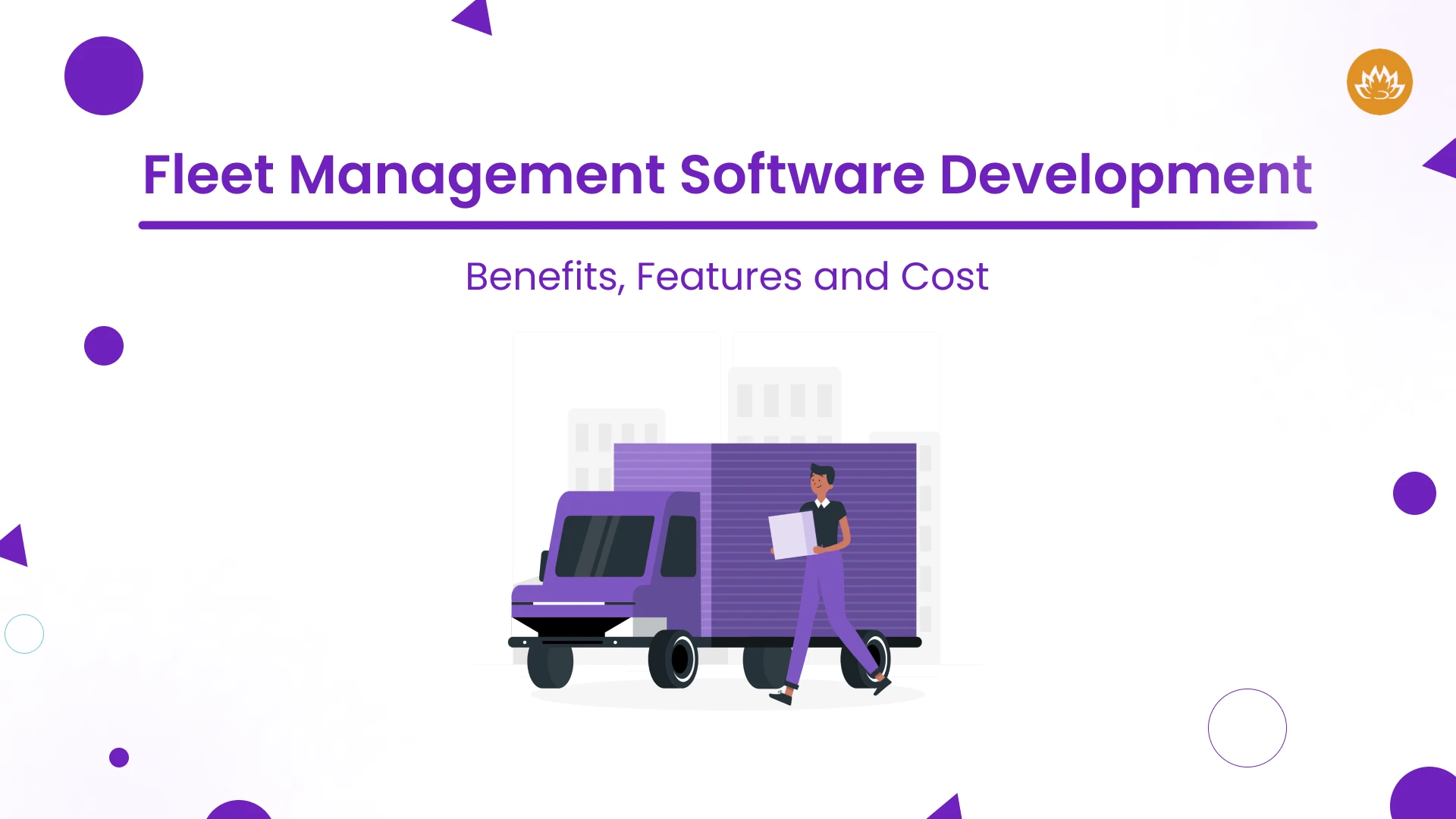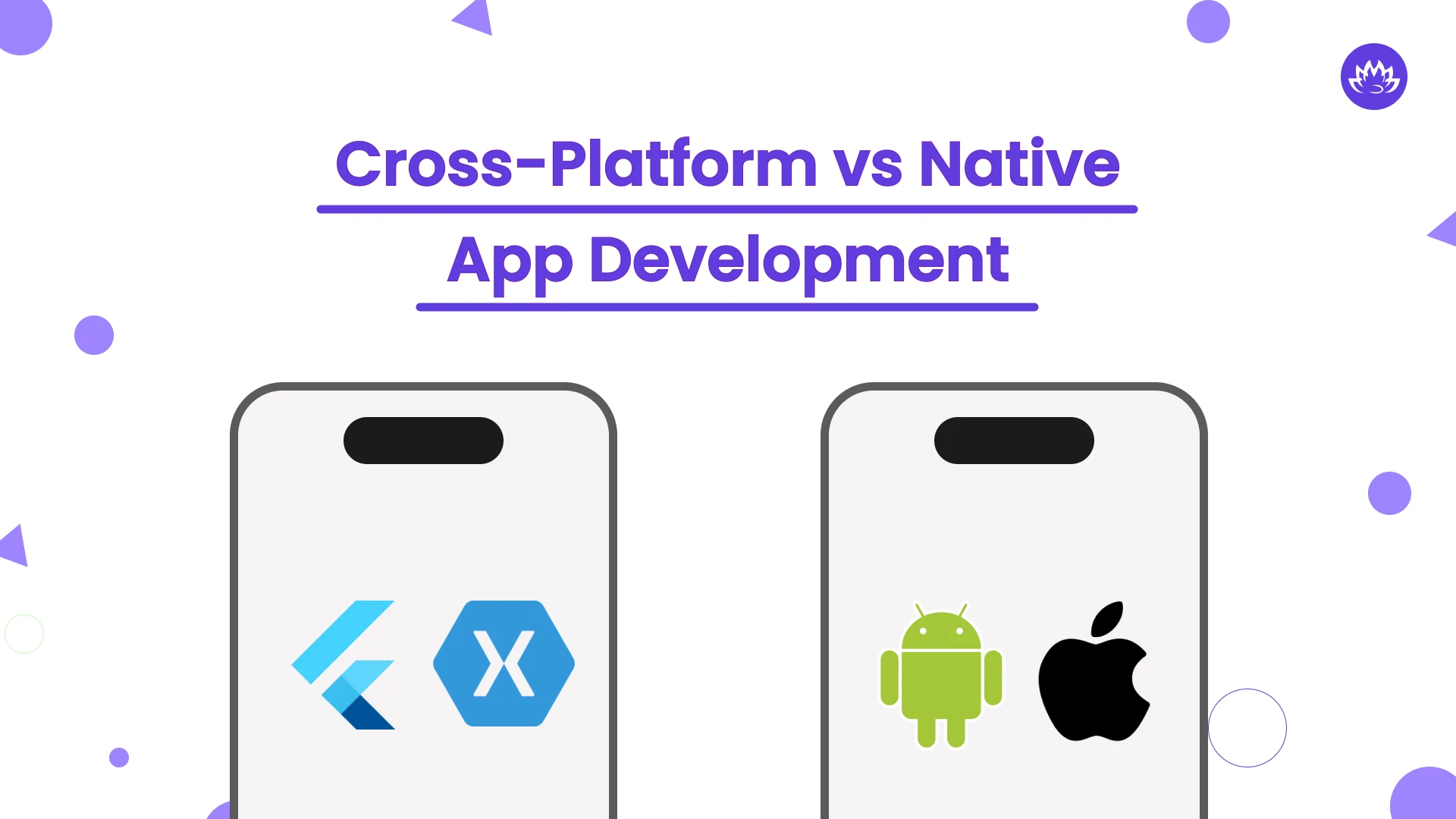Are you still annoyed with poor fleet visibility and unexpected breakdowns due to inadequate maintenance schedules? Managing a more extensive fleet can become complex with the increasing need to handle large volumes of data that require actionable insights. Rising fuel costs and constantly managing those drivers’ behavior are never-ending problems. However, there is a way to handle this chaos and improve your job.
So, those who have fleet management software live an easy life because it can orchestrate your ensemble assets, vehicles, and drivers! Sounds great, isn’t it? Well, laying down the facts of the logistics industry, we found it moving at an unprecedented pace. The fleet management market is evolving and expanding from $25.5 bn in 2022 and is estimated to touch the figure of $52.4 bn by 2027. Hence, there are numerous opportunities all around to start a venture in fleet management and help businesses streamline their operations.
Want to know everything about this tool? The blog will explain the benefits of fleet management software, the development process, and the costs. We will also discuss what features you need to incorporate to make it a success. At Whitelotus Corporation, our experienced team provides the best Fleet management app development services beyond normal. We always deliver outstanding UI/UX designs that drive business growth.
So let’s get started.
What is Fleet Management Software?
Fleet management software is a combination of several tools used by companies to manage their fleet of vehicles efficiently. With this software, you can gather and analyze data from different platforms, improve your business processes, and reduce operational costs.
At present, the key drivers in the market that boost the demand for fleet management software are AI-powered video telematics like dashcam solutions, carpooling, ride-hailing, car-sharing, mobility-as-a-service, improved GPS tracking, and vehicle-to-infrastructure connectivity. The core functionality of a fleet management web app can look like this:
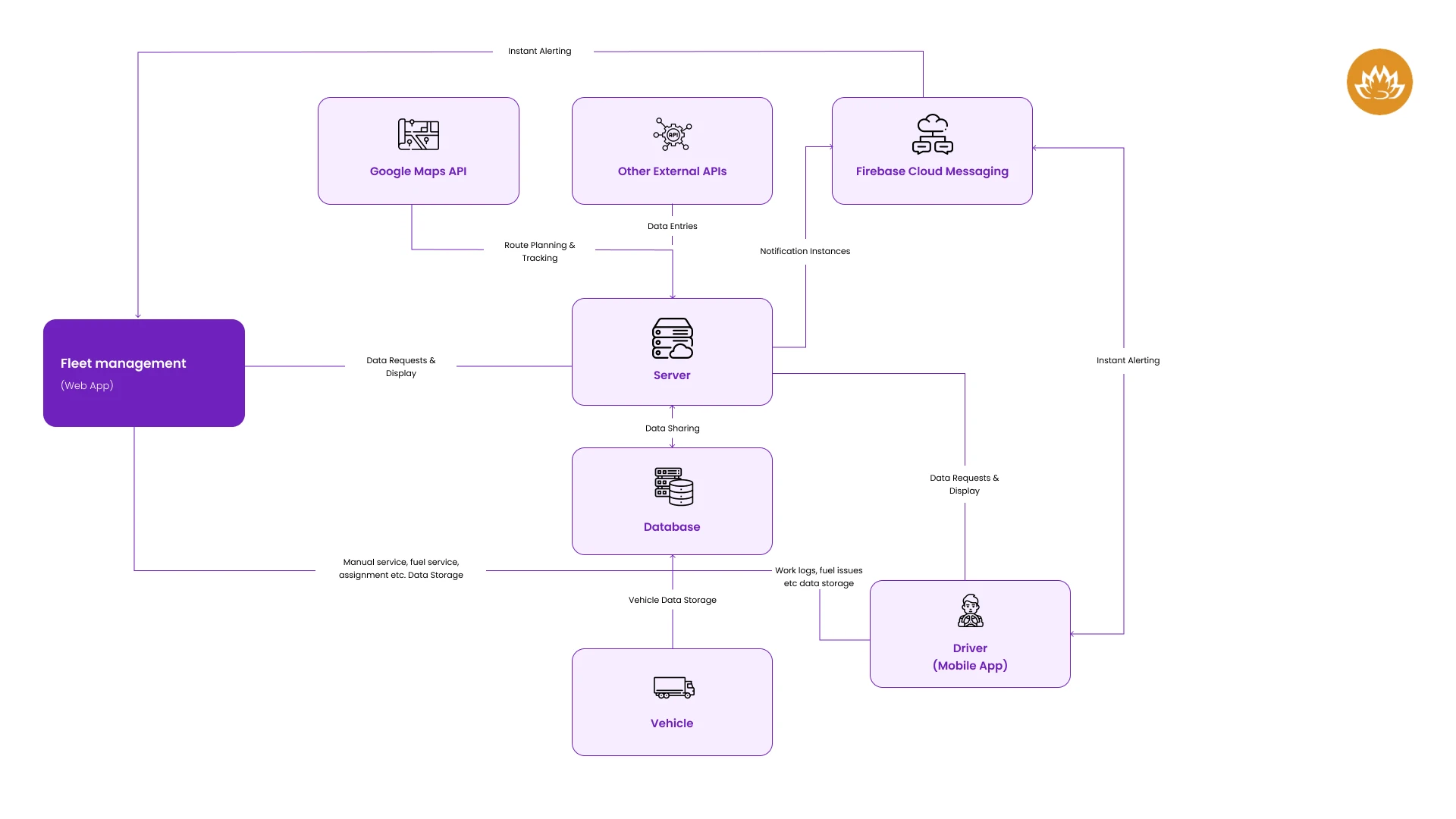
What are The Benefits of Fleet Management Software?
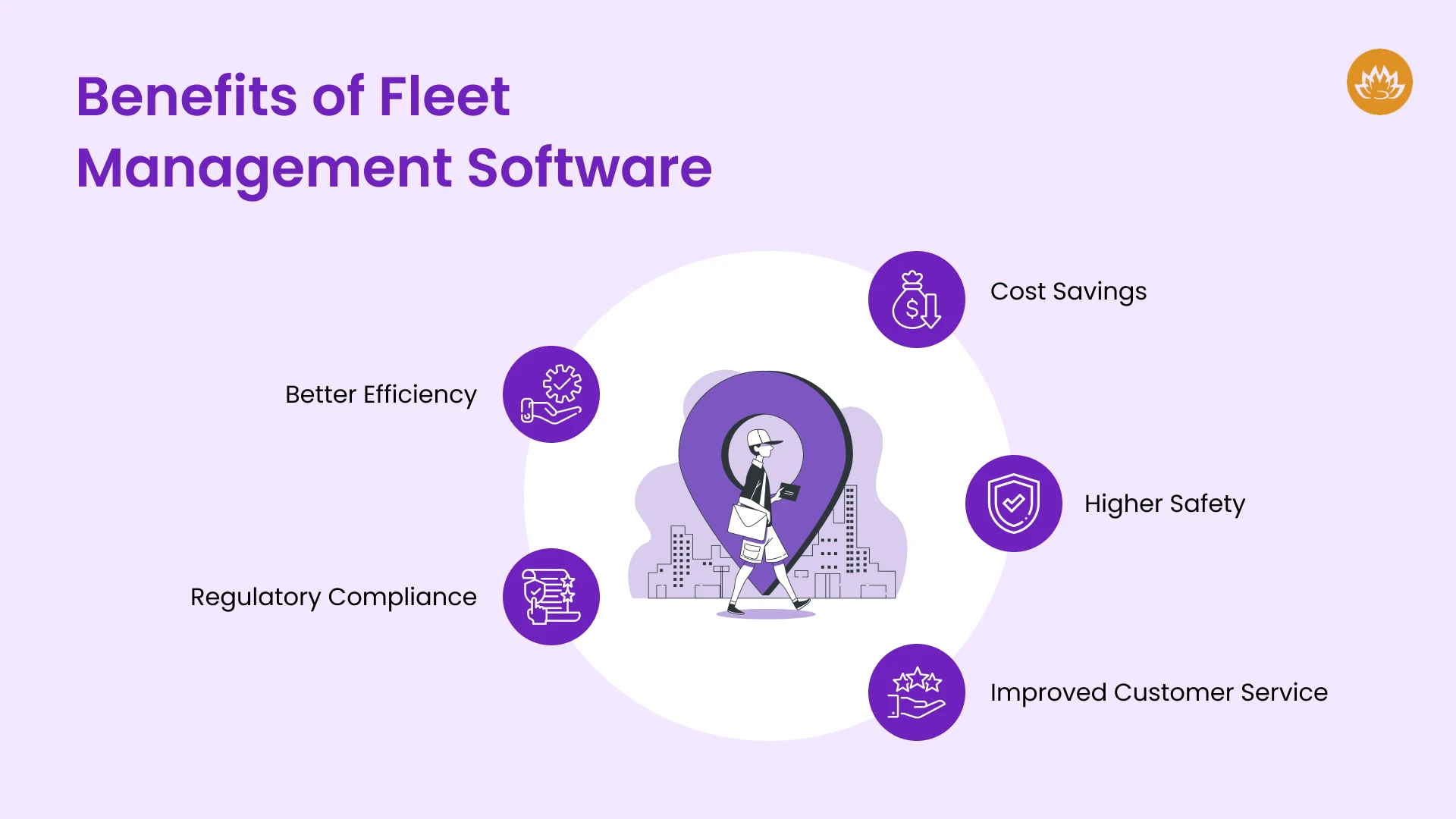
Companies can get several benefits by using robust fleet management software.
Better Efficiency
With efficient fleet management software, you can streamline your vehicle operations and automate numerous workflows like scheduling, dispatching, and vehicle utilization. It also improves communication between drivers and management through telematics solutions. Hence, it provides rapid responses to different queries and issues.
Cost Savings
Through real-time vehicle tracking, fleet managers can monitor fuel usage closely, reduce maintenance expenditures, and improve asset utilization. Hiring a trusted software development company to develop cost-efficient fleet management software can help you in many ways. They will help you provide in-depth performance analytics, intelligent route planning features, and timely maintenance alerts that can decrease the overall upkeep expenses of your large fleet.
Higher Safety
A robust fleet management software can empower you with high-tech tools that ensure safety regulations and encourage users to adopt safe driving practices. Moreover, any logistics app development company will provide a comprehensive solution for maintaining your fleet’s safety by implementing basic security measures like real-time monitoring, driver behavior analysis, instant alerts, custom reports, safety culture, etc.
Improved Customer Service
Providing real-time information about delivery status always helps businesses win customer satisfaction. This is because a well-managed fleet powered by robust software can deliver on time and improve overall customer relationships.
Regulatory Compliance
As a startup founder, you can hire dedicated developers from a reliable software development company to ensure your business software maintains regulatory compliance. Doing this can help you avoid unwanted penalties, minimize human errors, and provide seamless alignment with industry regulations.
Top Features You Must Have In Your Fleet Management Software
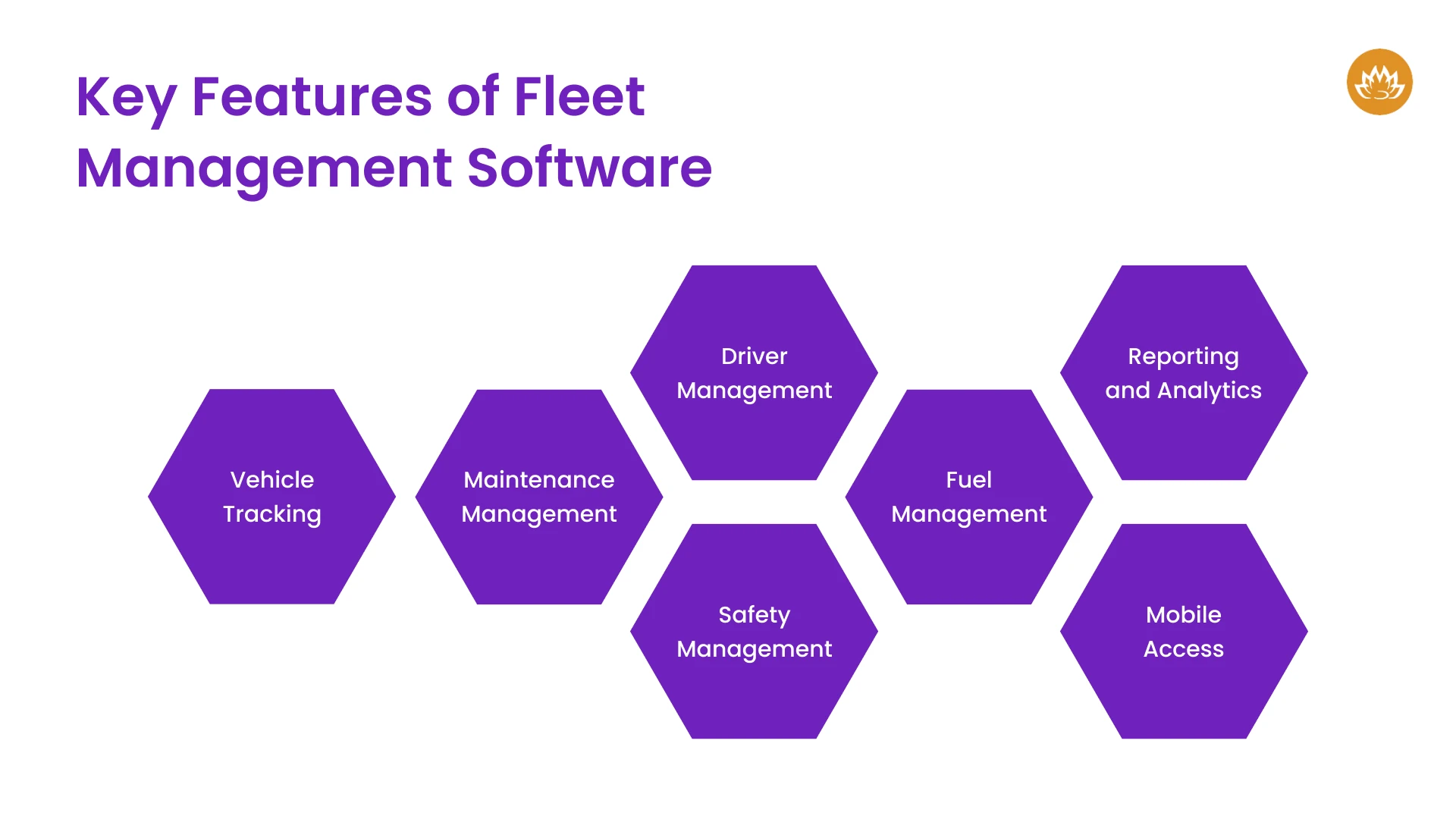
You can hire dedicated development team to develop dynamic fleet management software to manage your vehicles, drivers, and operations. What you must take care is to integrate the most trending and relevant features that can fulfill the needs of your customers. Some of the key features that you must essentially incorporate are:
Vehicle Tracking
-
Fleet managers can track their vehicles' location, direction, and speed in real-time.
-
Managers can optimize routes and reduce fuel consumption
-
They can analyze real-time data via GPS fleet tracking.
-
Fleet managers can make informed decisions regarding adjusting to the routes and driver behavior.
Maintenance Management
-
Managers can create schedules for regular maintenance.
-
They can track service records and obtain alerts for vehicle maintenance.
-
This feature ensures vehicles remain in good condition and face minimum breakdowns.
-
It improves vehicle longevity and reduces unwanted downtime, maximizing operational efficiency.
Driver Management
-
With this feature, vehicle management systems can track driver behavior, such as speed and braking patterns.
-
Managers can identify areas of improvement and give necessary feedback to drivers.
-
Drivers can improve their performance based on this constructive feedback and can work on their areas of improvement.
Safety Management
-
This feature offers safety alerts whenever unsafe driving practices are notified.
-
It can track data metrics like speed, harsh braking, and acceleration
-
It can also provide real-time feedback to drivers, leading to improved safety and safe driving practices.
Fuel Management
-
A robust fleet management software with a fuel management feature can help you track exact fuel consumption and create route optimization.
-
With this feature, organizations can save money and minimize their carbon footprint.
-
In addition, this feature provides route optimization and reduces fuel consumption.
-
It reduces costs and can align with implementing environmentally friendly practices that minimize carbon footprint.
Reporting and Analytics
-
This feature helps generate a detailed report and analytics on different areas of fleet operations.
-
Managers can identify trends, track performance, and make data-driven decisions.
-
The powerful reports and analytics feature can give valuable insights into various facets, such as the need for optimization, enhanced safety measures, cost-saving areas and possibilities, and helping drivers boost performance through reward programs.
Mobile Access
-
Fleet managers and supervisors can access real-time data and other important information about fleet, drivers, and operations while on the move.
-
With mobile accessibility, managers can make better decisions, quickly respond to queries, and monitor fleet activities from anywhere.
-
Mobile apps can provide real-time data analytics, enabling seamless communication between managers and drivers.
-
A reliable cross-platform development company can help you develop a robust mobile application that performs equally well as your desktop web app.
Type of Devices Used in Fleet Management Software
There are various fleet management systems that can help organizations manage vehicles, drivers, and operations. These systems combine hardware and software solutions.
GPS Tracking Devices
-
Allows fleet managers to track location, speed, and vehicle direction in real time
-
Determines the location of a vehicle through satellite signals, transmitting information to the software.
-
Can optimize routes and reduce fuel consumption
Telematics Devices
-
Can collect and transmit data on different range of vehicle metrics like engine performance
-
It can offer real-time insights into vehicle metrics to help managers make data-driven decisions.
Electronic Logging Devices
-
ELDs can track driver’s service hours and other regulations
-
They can connect with the vehicle engine and record service hours, duty status, and driving behavior.
-
Can provide valuable data on driver performance, ensuring safer and more efficient fleet operations.
Dashcams
-
They are small cameras mounted on the vehicle dashboard
-
They can record video footage of the road ahead and can provide evidence of an accident.
-
They are a valuable tool for monitoring driver behavior and finding road conditions.
Step-by-Step Guide to Develop Fleet Management Software

A well-established fleet management app development services provider will implement the following steps to build robust fleet management software. They will do it after understanding the industry challenges and needs of customers.
Identifying Unique Selling Proposition
-
Conduct a rigorous analysis of current solutions and identify their limitations
-
Create innovative functionalities that can primarily address the needs of target users.
-
Ensure your idea stands out by offering something unique and innovative and can also address industry-specific challenges.
Discovery Phase
-
Gather necessary information about the project and craft a detailed plan or a roadmap for the development process.
-
Conduct a comprehensive analysis of the target audience, market needs, and competitors.
-
Identify challenges the fleet management industry faces and focus on those features that can solve these issues.
-
Create a visual representation of the software layout and user interface, and make necessary adjustments.
-
Choose an appropriate list of technologies, routing providers, and geocoding services to ensure efficiency and cost-effectiveness.
UI/UX Design
-
Create stunning UI/UX designs that reflect company goals and user needs.
-
Ensure your designs resonate with the user persona and company solutions
-
Make sure you deliver a user-friendly interface that is intuitive and visually appealing.
MVP Development
-
Creating an MVP ( a minimum viable product)—a smaller version of your software that includes core functionalities—is crucial as it will help you determine the project's viability.
-
Ensure it is a basic and most functional version for further testing, refinement, and approval.
Quality Assurance
-
Ensure your software is highly functional and secure and meets all compliances.
-
It includes testing features, user feedback, and fixing bugs.
-
Do a rigorous QA process that can guarantee high-quality software
Deployment and Post-Release Support
-
Prepare your software for final release and submit it to various platforms with appropriate configuration.
-
Continuously maintain your software to ensure it can handle larger fleet and expanded user base.
What is The Cost of Developing Fleet Management Software
The cost of developing fleet management software depends on several features and app complexity. However, the rough estimates are as follows:
-
Minimum Viable Products can cost anywhere from $10000 to $50000
-
Complex applications with advanced features like predictive maintenance and advanced analytics can cost anywhere from $50000 to $150000
-
A highly sophisticated fleet management software with AI-driven predictive maintenance and real-time analytics can cost more than $150000
Conclusion
Whitelotus Corporation is a logistics app development company specializing in custom fleet management software solutions for businesses. We are a leading fleet management app development company delivering robust mobile and web applications. You can hire dedicated developers from Whitelotus Corporation to build small—and large-scale logistics applications. We know how to harness the tools and functionalities of various technologies to create the best solutions that will meet your expectations.
Author
-

Sunil is a result-orientated Chief Technology Officer with over a decade of deep technical experience delivering solutions to startups, entrepreneurs, and enterprises across the globe. Have led large-scale projects in mobile and web applications using technologies such as React Native, Flutter, Laravel, MEAN and MERN stack development.
View all posts



